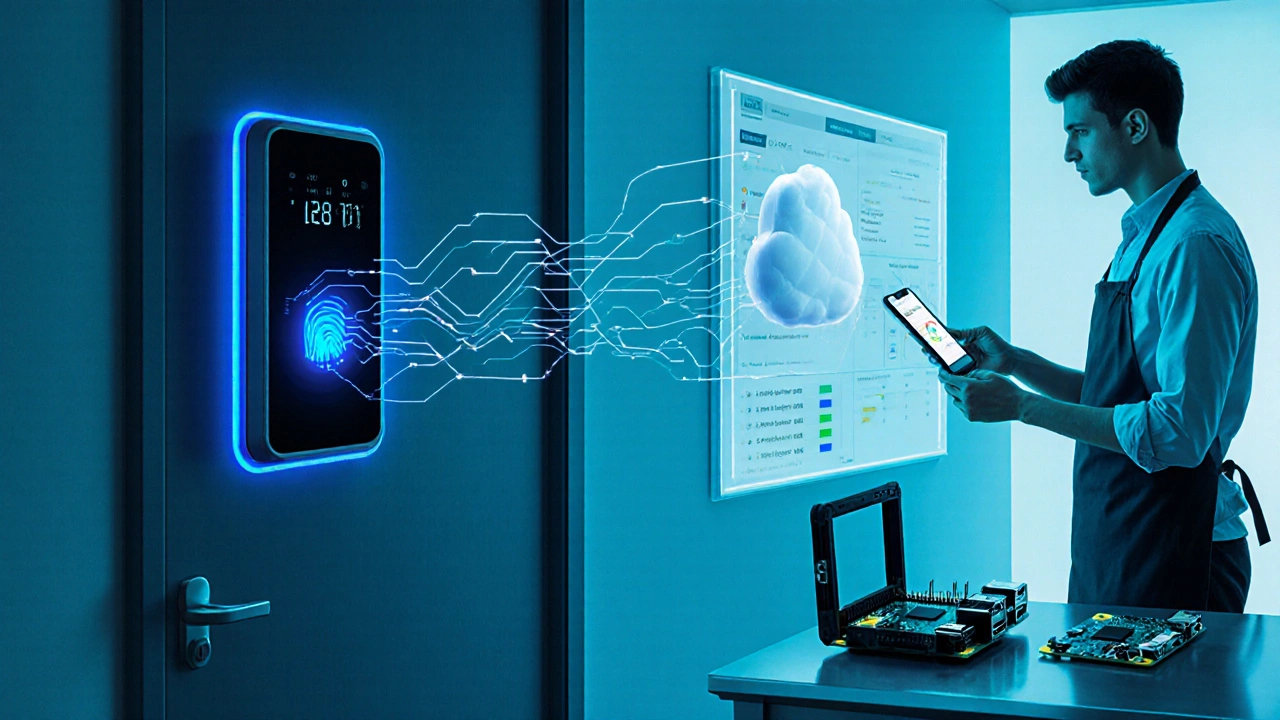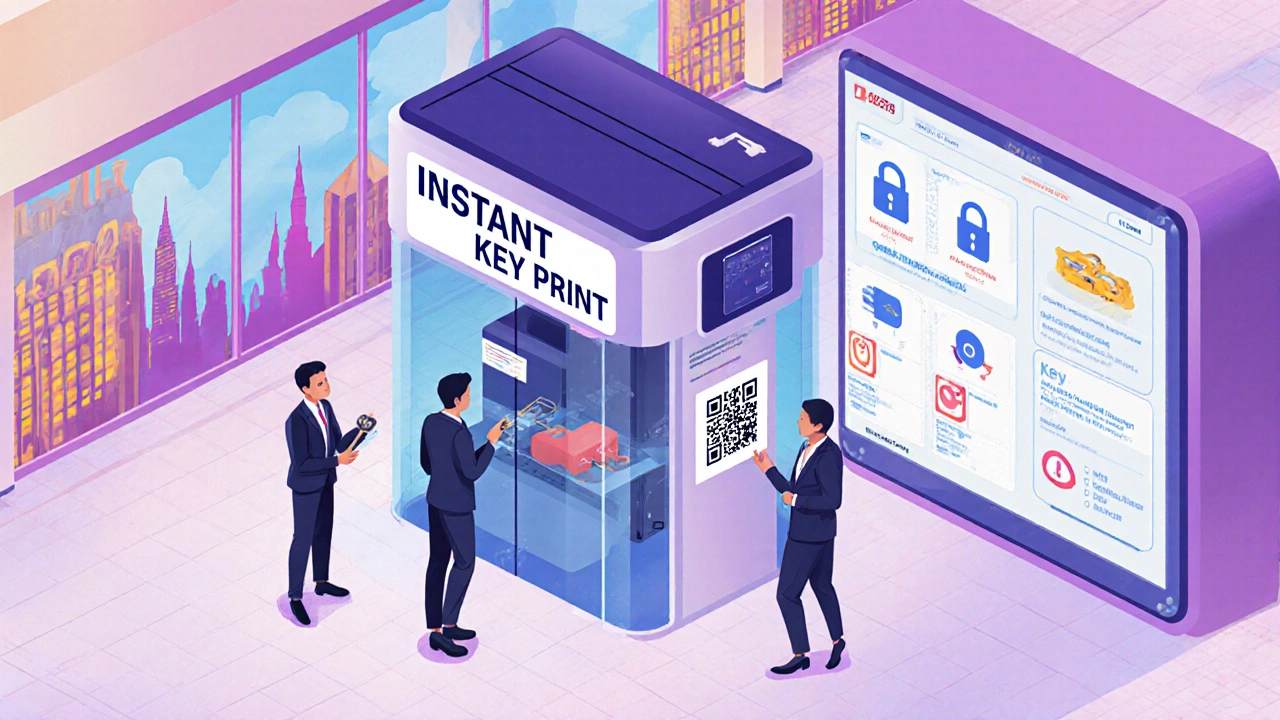
Smart Lock vs. Traditional Lock Cost Calculator
Calculate Your Locking Solution Costs
Compare the total cost of ownership for traditional and smart locks based on your specific needs.
When you hear the word "locksmith," you probably picture a person with a toolbox, a set of picks, and a metal workshop. future of locksmithing looks nothing like that. In the next decade, the trade will be driven by digital tech, new materials, and a surge in demand for secure yet convenient access solutions-especially in India’s fast‑growing urban markets.
Key Takeaways
- Smart locks and IoT will dominate new installations, shifting skill requirements toward electronics and networking.
- Biometric and mobile authentication are becoming standard for high‑value assets.
- 3D printing and CNC machining will speed up key duplication and prototyping.
- Locksmith training India is updating curricula to include cybersecurity basics.
- Entrepreneurial locksmiths can tap into niche services like digital key management and remote monitoring.
Why the Landscape Is Changing
India’s middle class is expanding, and with it comes a boom in gated communities, smart apartments, and commercial complexes. Property developers are demanding locks that can be managed from a smartphone, while businesses need audit trails for compliance. This market pressure is forcing traditional locksmiths to rethink their toolkits.
Emerging Technologies Shaping the Trade
Smart locks are electronic devices that replace or augment mechanical locking mechanisms. They connect to Wi‑Fi or Bluetooth, allowing owners to lock or unlock doors via an app, set temporary access codes, or receive alerts when someone tries to tamper with the lock. Major Indian manufacturers such as Godrej and Yale are rolling out models that integrate with home automation platforms like Google Home and Alexa.
Biometric authentication adds fingerprint, facial, or iris scanning to the lock’s verification process. In high‑security sectors-data centers, labs, and banks-biometrics are replacing traditional keys altogether because they are nearly impossible to clone.
Internet of Things (IoT) connects locks to broader security ecosystems. A lock can now send real‑time status updates to a cloud dashboard, trigger cameras, or lock down an entire building at the press of a button. Understanding MQTT protocols and basic cloud services is becoming a core competency for modern locksmiths.
3D printing is revolutionizing key duplication. Using durable polymers, locksmiths can print functional keys on‑site, reducing turnaround time from days to minutes. Combined with CNC milling, it also enables rapid prototyping of custom lock components.
Keyless entry systems-such as RFID cards, NFC tags, and QR codes-allow users to gain access without a physical key. They are popular in hotels and co‑working spaces, and they require locksmiths to understand encryption standards and access control software.
How Training Is Evolving in India
Locksmith training India has traditionally focused on metalworking, lock picking, and key cutting. Today, accredited institutes are adding modules on electronics, networking, and even basic cybersecurity. A typical 6‑month diploma now includes:
- Fundamentals of mechanical lock design.
- Introduction to electronic lock circuits.
- Programming micro‑controllers for smart lock prototypes.
- IoT connectivity basics and cloud dashboard setup.
- Cyber‑risk assessment for physical security devices.
- Business skills: pricing digital services, client contracts, and remote support.
Institutes such as the Institute of Locksmithing Technology (ILOT) in Delhi and the Karnataka State Vocational Training Center have started partnering with tech firms to give students hands‑on experience with platforms like Raspberry Pi and Arduino.

Skills Every Modern Locksmith Must Master
Below is a quick checklist of must‑have abilities for the next five years:
- Electrical wiring basics: reading schematics, soldering, and troubleshooting power supplies.
- Mobile app troubleshooting: installing, updating, and debugging lock‑control apps.
- Network security awareness: recognizing man‑in‑the‑middle attacks on Bluetooth lock communication.
- Rapid prototyping: using CAD software and 3D printers for custom keys.
- Regulatory compliance: understanding Indian standards like IS 5677 (electronic lock safety) and data‑privacy guidelines for access logs.
Comparison: Traditional Locks vs. Smart Locks
| Aspect | Traditional Mechanical Lock | Smart Lock |
|---|---|---|
| Mechanism | Physical pins, tumblers, and springs | Electronic motor/solenoid with firmware |
| Security | Relies on key secrecy; vulnerable to lock‑picking | Multi‑factor (code, biometrics, crypto); can be locked out remotely |
| Maintenance | Lubrication, re‑keying, occasional part replacement | Battery replacement, firmware updates, occasional hardware failure |
| Cost (India, 2025) | ₹500‑₹2,000 | ₹4,000‑₹15,000 depending on features |
| Training Needed | Key cutting, lock‑picking basics | Electronics, networking, app configuration |
Business Opportunities on the Horizon
With new tech comes new revenue streams. Here are three models that Indian locksmiths are already testing:
- Subscription‑based remote monitoring: Install smart locks for residential complexes and charge a monthly fee for cloud access, alerts, and firmware management.
- Digital key management: Offer businesses a platform to generate, revoke, and audit temporary digital keys for contractors and delivery services.
- On‑demand 3D key printing kiosks: Set up kiosks in malls where customers can instantly print replacement keys after identity verification.
These services require minimal upfront capital compared to opening a full‑scale workshop, making them attractive for young entrepreneurs.

Challenges and How to Overcome Them
Transitioning to a digital lock environment isn’t without hurdles:
- Cybersecurity risk: A poorly secured lock can be hacked. Solution: Follow best practices-use encrypted BLE, change default passwords, and keep firmware up‑to‑date.
- Customer skepticism: Many still trust a physical key more than a phone app. Solution: Offer hybrid locks that retain a mechanical key backup.
- Regulatory uncertainty: Indian standards for electronic locks are still evolving. Solution: Stay connected with bodies like the Bureau of Indian Standards (BIS) and attend their seminars.
Preparing for the Next Decade
If you’re considering locksmith training India or already work in the field, start building these capabilities now:
- Enroll in a certified course that includes electronics and IoT modules.
- Experiment with a Raspberry Pi‑based lock prototype-many tutorials are free online.
- Join professional groups such as the Indian Locksmith Association to stay updated on standards and market trends.
- Offer a pilot service to a local apartment complex-real‑world projects are the fastest way to learn.
By combining traditional craftsmanship with modern tech, you’ll not only stay relevant but also open doors (pun intended) to higher‑margin work.
Frequently Asked Questions
Will smart locks replace traditional locks completely?
Not in the near term. Many users still prefer a mechanical backup, and some high‑security environments require a physical key. Hybrid solutions that offer both are the most common today.
What is the average cost to upskill as a digital locksmith?
A comprehensive 6‑month diploma that covers electronics, IoT, and cybersecurity ranges from ₹15,000 to ₹30,000, depending on the institute and whether lab equipment is included.
Are there any government certifications for smart lock installers?
The Bureau of Indian Standards (BIS) is drafting IS 5678 for electronic lock safety. While certification is not mandatory yet, many employers prefer installers who hold a BIS‑approved credential.
How secure are Bluetooth‑enabled locks?
When implemented with strong encryption (AES‑128 or higher) and rotating keys, Bluetooth locks are comparable to traditional locks. Vulnerabilities arise mainly from default passwords or outdated firmware.
Can I start a locksmith business with only a smartphone?
A smartphone can help you manage smart‑lock installations and remote monitoring, but you’ll still need basic tools for mechanical work and a reliable internet connection for cloud services.
Whether you’re a fresh graduate exploring locksmith training India or a seasoned craftsman eyeing digital upgrades, the future of locksmithing is full of opportunity. Embrace the tech, stay curious, and you’ll keep the doors open for years to come.
